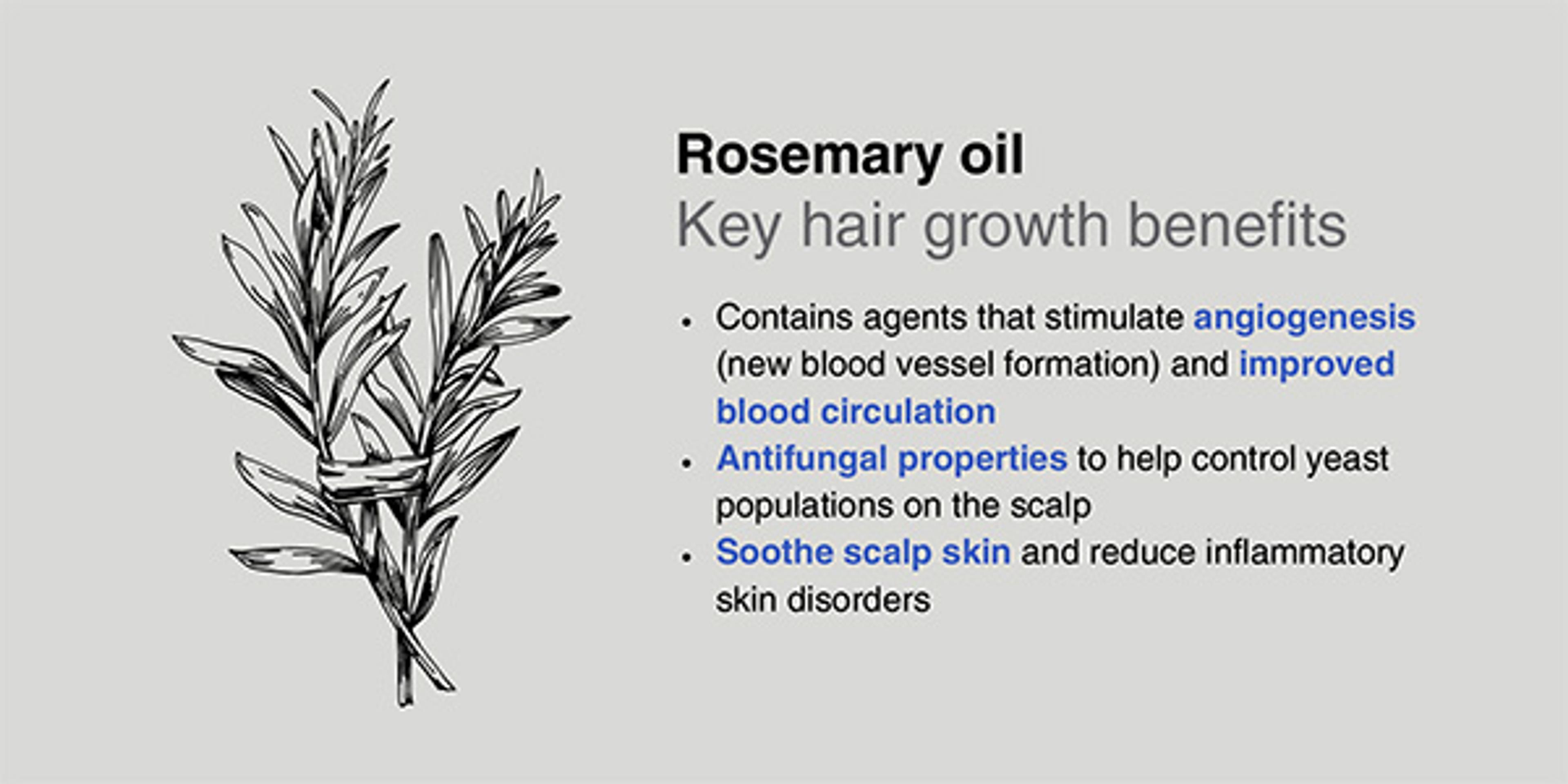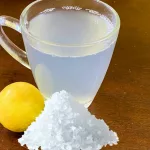Rosemary essential oil may offer various health advantages, such as supporting cognitive performance and encouraging hair growth, among other effects.
Rosemary (Rosmarinus officinalis) is an evergreen shrub with narrow, needle-like leaves that bear glandular hairs which release fragrant volatile essential oils.
Although most commonly used as a culinary herb, rosemary is one of the world’s most widely used aromatic and medicinal plants (2).
The plant’s essential oil — containing its key active constituents, or essence — is extracted and sold in small dropper bottles.
Because rosemary oil has a long history of medicinal use, researchers have investigated its potential as a source for new therapeutic agents, as summarized in a 2018 review.
While much of this research is emerging, it supports some traditional claims and points to additional possible applications.
Below are 14 possible benefits and uses of rosemary essential oil.
1. May boost brain function
In ancient Greek and Roman traditions, rosemary was believed to enhance memory (5).
Studies suggest that inhaling rosemary oil may slow the breakdown of acetylcholine, a neurotransmitter important for thinking, attention and memory.
In one experiment, 20 healthy young adults exposed to diffused rosemary oil for varying durations in a small room showed improvements in speed and accuracy that correlated with how long the oil was diffused.
Their blood concentrations of certain rosemary constituents also rose, demonstrating that inhaled rosemary compounds can enter the body through respiration alone.
Additional research indicates that inhaling rosemary and other essential oils might help cognitive function in older adults with dementia, including Alzheimer’s disease.
Keep in mind that further research is needed.
2. Encourages hair growth
One of the most frequent forms of hair thinning is androgenetic alopecia, commonly called male pattern baldness, though it can affect women as well (9).
Androgenetic alopecia is thought in part to result from a testosterone byproduct damaging hair follicles (9).

When men with androgenetic alopecia massaged diluted rosemary oil into their scalps twice daily for six months, they saw increases in hair thickness comparable to those from minoxidil (Rogaine), a standard hair regrowth treatment.
Those using rosemary oil also reported less scalp irritation than the minoxidil group, suggesting rosemary may be better tolerated.
Research also suggests rosemary oil could combat patchy hair loss (alopecia areata), a condition affecting up to half of people under 21 and about 20% of those over 40.
In a trial where people with alopecia areata applied a rosemary essential oil blend to the scalp daily for seven months, 44% improved versus 15% in the control group using neutral jojoba and grapeseed oils.
3. May reduce pain
In herbal traditions, rosemary has been used as a mild analgesic. It has also been evaluated as a non-drug adjunct for pain relief.
In a two-week trial, stroke survivors with shoulder pain who received a rosemary oil blend combined with acupressure for 20 minutes twice daily experienced a 30% reduction in pain, while those receiving only acupressure saw a 15% reduction.
4. Repels certain insects
If you want to deter biting insects or garden pests, rosemary oil can serve as a natural alternative to synthetic chemicals.
A rosemary-oil-based pesticide, EcoTrol, sprayed on greenhouse tomato plants reduced two-spotted spider mite populations by 52% without harming the plants.
Rosemary also helps ward off some blood-feeding insects that transmit harmful pathogens.
When compared with 11 other essential oils, rosemary produced the longest-lasting repellent effect against Aedes aegypti mosquitoes, a vector for Zika virus. A 12.5% rosemary oil dilution repelled 100% of mosquitoes for 90 minutes (, 17).
Moreover, a 10% rosemary oil spray performed similarly to the chemical insecticide bifenthrin for controlling black-legged ticks — carriers of Lyme disease — in infested areas in the northeastern United States.
5. May relieve stress
Stress can arise from many sources, such as exams. Inhaling rosemary oil may lessen test-related anxiety.
Nursing students who inhaled rosemary oil from an inhaler before and during testing had heart rates about 9% lower, whereas those without rosemary showed no significant change.
Since elevated pulse rates reflect short-term stress and anxiety, rosemary inhalation may help reduce acute stress.
In another trial, 22 young adults who sniffed rosemary oil for five minutes had 23% lower salivary cortisol — a stress hormone — compared with those exposed to a non-aromatic substance.
High cortisol can weaken the immune system, contribute to sleep problems and cause mood disturbances, among other issues (22).
6. May improve circulation
Poor circulation is a frequent complaint, often noticed in hands and feet.
If your fingers and toes feel cold even in mild temperatures, rosemary oil might be worth trying.
In one case study, a woman with Raynaud’s disease — a circulatory disorder — massaged her hands with a rosemary oil blend and experienced warmer fingers compared with using a neutral oil; thermal imaging confirmed the change.
Raynaud’s causes blood vessels in fingers and toes to constrict when cold or stressed, making them pale and cold.
Rosemary oil may help dilate blood vessels, increasing blood flow to extremities.
Further research is required to validate these observations, but rosemary could be a low-cost option to experiment with.
7. May increase alertness
In folk medicine, rosemary oil is often used for mental fatigue and concentration issues (25).
When 20 healthy young adults inhaled rosemary oil, they reported feeling roughly 30% more mentally refreshed and about 25% less sleepy compared with a placebo scent.
This heightened alertness matched changes observed in brainwave patterns.
Nonetheless, more studies are necessary to confirm these findings.
8. May reduce joint inflammation
Non-drug approaches to easing pain and inflammation are not extensively studied. Preliminary data suggest rosemary oil might help reduce tissue inflammation associated with swelling, pain and stiffness.
Laboratory experiments indicate it may limit white blood cell migration to injured tissues, thereby decreasing release of inflammatory mediators.
Rheumatoid arthritis is an autoimmune disease in which the immune system attacks joint tissues, leading to inflammation of joint linings.
In a study of people with rheumatoid arthritis, three-times-weekly 15-minute knee massages with a rosemary oil blend produced a 50% reduction in inflammatory knee pain after two weeks, versus a 12% reduction in those not receiving the oil.
More clinical research is needed on rosemary’s anti-inflammatory effects.
9–13. Additional potential uses
Researchers are exploring other possible applications for rosemary oil, but human trials are limited.
Results from test-tube studies don’t necessarily translate to outcomes in people using essential oils by inhalation or topical application, which are common routes for human use.
Some animal studies have administered rosemary oil orally, but ingesting essential oils is not recommended. Essential oils should not be swallowed.
Still, rosemary oil shows promise for:
- Cancer: Its antioxidant and anti-inflammatory properties have led to test-tube evidence that rosemary compounds may be toxic to cancer cells.
- Liver and digestive health: Animal work suggests rosemary oil may stimulate bile release — aiding fat digestion — and activate antioxidant defenses to protect the liver.
- Foodborne pathogens: Rosemary oil can inhibit growth of certain bacteria that cause food poisoning. This use requires precise, minimal amounts of food-grade oil and shouldn’t be attempted at home (34, 35).
- Antibiotic side effects: Rosemary and other essential oils may boost the efficacy of certain antibiotics, potentially allowing lower drug doses and reducing adverse effects.
- Antibiotic resistance: Some evidence suggests rosemary and other essential oils can disrupt the cell walls of antibiotic-resistant bacteria, damaging them and enabling antibiotics to penetrate (, 37, ).
14. Simple ways to use it
Rosemary oil can be inhaled or applied to the skin. It is highly concentrated, so use only a few drops at a time. The small bottles typically include plastic droppers which help dispense individual drops.
Although some producers claim their essential oils are safe to ingest, there’s little scientific support for internal use — particularly long term. Essential oils should not be consumed.
Below are easy recommendations for inhalation and topical application of rosemary oil.
Inhaling
The easiest inhalation method is opening the bottle and breathing in the aroma. Alternatively, place a few drops on a cloth or tissue and hold it near your nose.
Many people use aromatherapy diffusers, which disperse the essential oil into the surrounding air.
Avoid positioning a diffuser close to infants or small children, since it’s difficult to gauge how much they’re inhaling.
Topical application
Rosemary and other essential oils are readily absorbed through the skin into the bloodstream.
It’s generally recommended to dilute essential oils with a neutral carrier oil, such as jojoba, to reduce the risk of skin irritation and prevent rapid evaporation.
Here are general dilution guidelines for topical use:
DilutionHow to prepare itBabies0.3%Use 1 drop essential oil per 1 tablespoon carrier oilChildren1.0%Use 1 drop essential oil per 1 teaspoon carrier oilAdults2.0-4.0%Use 3-6 drops essential oil per 1 teaspoon carrier oil
After diluting, apply to the soles of the feet or the targeted body area (for example, a sore muscle), then massage the oil into the skin. This enhances blood flow and oil absorption.
Avoid applying rosemary or other essential oils to broken skin or near sensitive regions such as the eyes.
People who are pregnant or have epilepsy or high blood pressure are typically advised to avoid rosemary oil, as it may exacerbate the latter two conditions (, 40, 41).
The bottom line
Rosemary essential oil, extracted from the familiar culinary herb, has a long history in traditional medicine and is increasingly supported by scientific studies.
Although much of the evidence is preliminary, research indicates this essential oil may enhance focus and memory, help counter hair loss, relieve pain and inflammation, repel some insects and reduce stress.
If you decide to try rosemary oil, inhale it or apply a diluted formulation to the skin. Because the oil is potent, only a few drops are needed at a time.
























Leave a Reply
You must be logged in to post a comment.